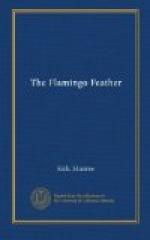At last Laudonniere called in the soldiers and ordered them to take the prisoner to the guard-house, and there treat him kindly, but to watch him closely and on no account allow him to escape. When Has-se had thus been removed, Laudonniere turned to the members of the council, and asked what, in their opinion, should be done with him.
Le Moyne, the artist, declared that the young Indian should be set free at once, and treated with such kindness that he might thereby be induced to give them the information they sought to gain. Then Rene de Veaux, blushing at his own boldness, jumped to his feet and made a vehement little speech, in which he said that Has-se was his dear friend, and that, as he himself had said, they had no right to make a prisoner of him, besides much more to the same effect. He became so excited in his defence of the Indian lad that finally his uncle interrupted him, saying,
“Softly, softly, Rene! Thou art right to defend thy friend if indeed he be not our enemy, but thou hast no authority for finding fault with those who are much older and wiser than thyself.”
Blushing furiously at this rebuke, Rene sat down, while his uncle continued: “I am also of the opinion that this young savage should be courteously entreated and set at liberty. Thus shall we win favor with his tribe, with whom it behooves us to remain on friendly terms.”
The others of the council did not, however, agree with this, but thought the better plan would be to retain the Indian lad as a hostage, and demand of his tribe a great quantity of provisions as his ransom.
As they were in the majority, Laudonniere hesitated to act contrary to their counsel, and finally said that they would hold him for at least one day, and that in the mean time Rene should visit him, and endeavor to extract from him the desired information regarding the movements of his people.
When Rene, armed with his uncle’s authority for so doing, passed the sentinel and entered the guard-house, he found the Indian lad seated on a rude bench in one corner, with his face buried in his hands. He sprang to his feet at Rene’s approach, and stood silently regarding him, not knowing but what he too had become an enemy. Carefully closing the door behind him, the impulsive French boy stepped quickly over to where the other stood, and embraced him, saying, as he did so, “Surely, Has-se, my brother, thou canst not think that I am aught but thy friend?”
Thus reassured, Has-se returned the embrace, and said, “I know thou art my friend, Ta-lah-lo-ko, and I did wrong to doubt thee for a moment; but it maddens me to be thus caged, and I am become like Nutcha the hawk when restrained of his liberty, suspicious of all men.”
Then both boys sat down on the bench, and Rene questioned Has-se regarding the sudden departure of the Indians, and why he was there alone.




